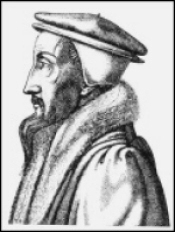John Calvin Biography Collection (10 vols.)
Digital Verbum Edition
Overview
John Calvin, most known for his undeniable role in the Reformation, is a pivotal figure in the history of the Church. Calvin's depth of character, morality and convictions are revealed in this 10-volume collection of biographies. The authors, through exhaustive study and conscientious attention to detail, provide insight into the man behind the legend and beyond the controversies of his life. The authors strive for objectivity and rely on credible historic sources, but most importantly the words of Calvin himself from his various Letters and works over the years. From broad strokes of Calvin's character to minute intricacies of his relationships, this collection will paint a clear and vivid picture of John Calvin—as reformer, teacher, preacher, friend, statesman, and above all, devoted follower of Christ.
The Logos Bible Software edition of John Calvin's Biographies contains links directly to Scripture and other books and articles in your digital library. All Scripture references display the verse on mouse over, and each reference is linked to the original language texts of the Bible and the English translations in your digital library.
Key Features
- Historical records of Calvin's life, work and legacy
- In-depth study of his influences and circumstances that helped shape his theology and deep convictions
- Photos and illustrations of key places in Calvin's life add interest and setting
- Logos edition provides integrated access to Scripture references, instantly linking to English and original text versions of the Bible
Product Details
- Title: John Calvin Biography Collection (10 Vols)
- Volumes: 10
- Pages: 3,447
About John Calvin

John Calvin was a theologian, pastor, biblical exegete, and tireless apologist for Reformed Christianity, and ranks among the most important thinkers in church history. His theological works, biblical commentaries, tracts, treatises, sermons, and letters helped establish the Reformation as a legitimate and thriving religious movement throughout Europe. No theologian has been as acclaimed or assailed as much as Calvin. Calvinism has spawned movements and sparked controversy throughout the centuries. Wars have been fought both to defend and destroy it, and its later proponents began political and theological revolutions in Western Europe and America. The breadth and depth of the engagement with his works since they first appeared four centuries ago—and their continuous publication since then—testifies to Calvin’s importance and lasting value for the church today. Thinking Christians from the twenty-first century who ignore Calvin’s writings do so at their own peril.
John Calvin was born on July 10, 1509 in Noyan, in France. He began his work in the church at the age of twelve, intending—at the request of his father—to train for the priesthood. Calvin attended the Collège de la Marche in Paris, before studying law at the University of Orléans in 1526 and continuing his studies at the University of Bourges. In 1532, Calvin’s first published work appeared: a commentary on Seneca's De Clementia.
On year later, he befriended Nicolas Cop, the rector of the Collège Royal in Paris. This friendship resulted in trouble for Calvin when Cop was branded a heretic after calling for reform in the Catholic Church. Cop fled to Basel, and Calvin was forced from Paris. The controversy expanded when, on the evening of October 18, 1534, anonymous attacks against the Mass were posted on public buildings, fueling the violence in the city. Calvin left France for Basel in January. The controversy, and the trouble it caused Calvin, disciplined him in his writing project, and he began working on the first edition of The Institutes of the Christian Religion, which appeared in 1536.
n June, 1536, Calvin returned to Paris as the violence subsided, but was expelled again in August of 1536. He left for Strasbourg, but was forced to Geneva instead, where he stayed at the request of William Farel. He became a reader in the church in 1537. In late 1537, Calvin fled Geneva after a controversy surrounding the Eucharist. He traveled to Basel before accepting a position at the church in Strasbourg. There, Calvin continued working on both the second edition of the Institutes and his Commentary on Romans. At the urging of his friends, Calvin married Idelette de Bure. He returned to Geneva in 1541.
Upon his arrival to Geneva, Calvin began writing prolifically. He continued his revisions to the Institutes, preached weekly, taught the Bible during the week, and delivered lectures on theology. Calvin also continued work on his New Testament commentaries.
His return to Geneva was not without controversy, however. He faced opposition from the libertines, who, in 1552, compromised his authority and nearly succeeded in banishing him from Geneva a second time. His greatest threat, however, came from his theological antagonist, Servetus. The frequent letters between Calvin and Servetus contain elements of their tenuous relationship, which were exacerbated when Servetus visited Geneva against Calvin’s orders, publicly denied the Trinity, and disgraced the church. He was condemned for heresy and executed.
By 1553, Calvin was praised for his work in uniting Geneva and securing the future of the Reformation. The church housed refugees from England—among them John Knox—who brought the Reformed faith to England. Calvin also sent more than 100 Reformed missionaries to France, and frequently corresponded with both political leaders and second generation Reformers throughout Europe. He also founded a school in Geneva, and Theodore Beza became its first rector. Calvin’s influence quickly expanded beyond the vicinity of Geneva.
During the 1550s, Calvin’s health began to decline, prompting him to undertake a final revision and expansion of The Institutes of the Christian Religion. It was published in 1559, and was immediately reprinted and translated throughout Europe. Calvin became ill in early 1564, and preached his last sermon on February 6 of that same year. His health worsened throughout the spring, and he died on May 27. Thousands flocked to view his body, forcing the council in Geneva to bury him in an unmarked grave.